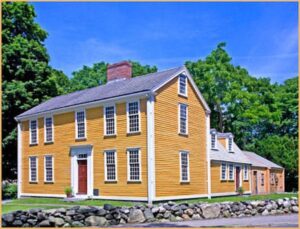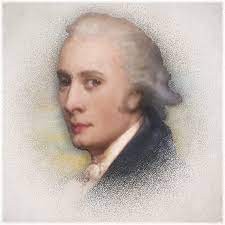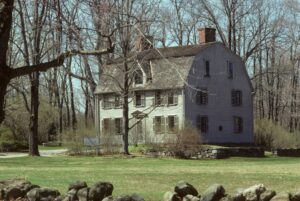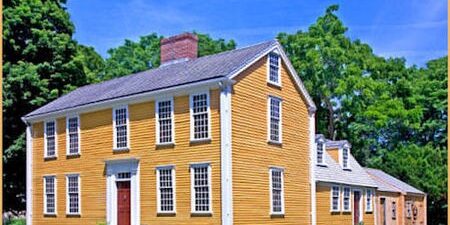 The Hancock-Clarke house in Lexington is a quarter of a mile off the green where 8 militia lost their lives and 10 were wounded on April 19, 1775 (250 years ago). It had been built by Rev. John Hancock, Patriot John Hancock’s grandfather, in 1737. Rev. Jonas Clarke, who had become Lexington’s pastor in 1755 and who turned 45 that April 19, served the 125 families and 700 inhabitants as their minister. But Pastor Clarke’s job description was not limited to those who attended church, for his application of biblical principles extended to the town and beyond. Nine of his and Lucy’s 10 children were home that April 19.
The Hancock-Clarke house in Lexington is a quarter of a mile off the green where 8 militia lost their lives and 10 were wounded on April 19, 1775 (250 years ago). It had been built by Rev. John Hancock, Patriot John Hancock’s grandfather, in 1737. Rev. Jonas Clarke, who had become Lexington’s pastor in 1755 and who turned 45 that April 19, served the 125 families and 700 inhabitants as their minister. But Pastor Clarke’s job description was not limited to those who attended church, for his application of biblical principles extended to the town and beyond. Nine of his and Lucy’s 10 children were home that April 19.
 Clarke had written instructions regarding the Stamp Act in 1765, which were adopted by the Lexington town meeting in October of that year. Theodore Gilman wrote:
Clarke had written instructions regarding the Stamp Act in 1765, which were adopted by the Lexington town meeting in October of that year. Theodore Gilman wrote:
“He rests his argument on British law from the Great Charter [Magna Charta] of June 15th, 1215 down to the charter rights as they existed before the parliamentary attempt to take them away. Mr. Clark’s paper was entered on the minutes of the town of Lexington, as a permanent record, so, to use his words, ‘that the world may see and future generations know that the present [generation] both know and value the rights they enjoyed and did not tamely resign them for chains and slavery.’”
In his sermon before the Ancient and Honorable Artillery Company, delivered June 6, 1768, Clarke stated, “In a state of nature, every man has a right to liberty, property and life… Society is formed for the preservation and defense of the common rights of mankind, to the end, that the blessings of life may be secured to all.” He closed by stating, “To revive and encourage a military spirit and martial exercises, upon religious principles… from love to GOD and our country, from a sacred regard to our own safety and happiness… to mutual protection and defense.”
Interspersed with a day of fasting and prayer, Clarke’s Declarations and Resolves, adopted by Lexington on September 21, 1768, succinctly clarified how Parliament was violating the very written charter of the rights given to British subjects. In 1772, and then again in 1773, Clarke articulated a submissive attitude required by the biblical doctrine of interposition (submission before God). But the repeated acts in violation of their rights also required them to be in submission to the Continental Congress (under authority). The resistance of the men of his congregation on Lexington Green on April 19, 1775 was the result of both preaching and putting into practice of how the Bible says to resist tyranny.
One year later, in his anniversary sermon on April 19, 1776, he declared:
“But it is not by us alone that this day is to be noticed. From this ever-memorable day will an important era begin both for America and Britain. And from the 19th day of April 1775, we may venture to predict, will be dated in future history the liberty or slavery of the American world, according as a Sovereign God shall see fit to smile or frown upon the interesting cause in which we are engaged.”
 The Old Manse in Concord, built by Pastor William Emerson in 1770, served as the church’s parsonage. It is close to the North Bridge where the “shot heard round the world” took place, during which time Pastor Emerson was at home with his wife Phebe and their four children: William, Jr.; Hannah; Phebe; and Mary. Emerson memorized his sermons and delivered them with eloquence and passion. Articulate to address the current situation in his sermons, in March he told the newly-formed minutemen, “Arise! my injured countrymen! and plead even with the sword, the firelock and the bayonet, plead with your arms the birthright of Englishmen, the dearly-purchased legacy left you by your never-to-be-forgotten Ancestors…”
The Old Manse in Concord, built by Pastor William Emerson in 1770, served as the church’s parsonage. It is close to the North Bridge where the “shot heard round the world” took place, during which time Pastor Emerson was at home with his wife Phebe and their four children: William, Jr.; Hannah; Phebe; and Mary. Emerson memorized his sermons and delivered them with eloquence and passion. Articulate to address the current situation in his sermons, in March he told the newly-formed minutemen, “Arise! my injured countrymen! and plead even with the sword, the firelock and the bayonet, plead with your arms the birthright of Englishmen, the dearly-purchased legacy left you by your never-to-be-forgotten Ancestors…”
 Only a few weeks later, around 1:00 AM on Wednesday, April 19, the bell on top of the Concord Meetinghouse began to ring, and Parson Emerson was the first to heed the call with his firelock, encouraging the militia. In his own words, “We retreated over the bridge, when the troops came into town, set fire to several carriages for the artillery… set a guard of 100 men at the North Bridge, and sent up a party to the house of Col. Barrett….” The British didn’t find what they were looking for, for it had been hidden. Emerson had preached, taught, and encouraged those in Concord not to fire unless fired upon, but also to fight if fired upon.
Only a few weeks later, around 1:00 AM on Wednesday, April 19, the bell on top of the Concord Meetinghouse began to ring, and Parson Emerson was the first to heed the call with his firelock, encouraging the militia. In his own words, “We retreated over the bridge, when the troops came into town, set fire to several carriages for the artillery… set a guard of 100 men at the North Bridge, and sent up a party to the house of Col. Barrett….” The British didn’t find what they were looking for, for it had been hidden. Emerson had preached, taught, and encouraged those in Concord not to fire unless fired upon, but also to fight if fired upon.
As Emerson noted, “We were the more cautious to prevent beginning a rupture with the King’s troops, as we were then uncertain what had happened at Lexington…. We received the fire of the enemy in three several and separate discharges of their pieces before it was returned by our commanding officer.” As with Clarke’s home, where the injured were cared for, so the Old Manse quickly became the center for the care of women, children and the fearful in need of confident leadership.
Like Pilgrim Pastor John Robinson, whose teachings and example created a foundational legacy for future generations, so Pastors Clarke and Emerson left a wake of liberty under law. Jonas Clarke continued to lead his church, the town of Lexington, and the state of Massachusetts until he passed in 1805 at 74 years of age. William Emerson, 32 on April 19, 1775, became the first unofficial chaplain in the War for Independence. He met with George Washington several times, moved Harvard College to Concord during the siege at Boston, and served the army at Fort Ticonderoga as an official chaplain. He died at 33 from dysentery, never returning to Phebe or his five young children at the Old Manse.
What lessons can we learn after 250 years? First, long before there was a war for independence, the gospel was first preached and revived hearts. The Great Awakening prepared the soil, and pastors who preached Christ saw great results; revived churches were numerous. Second, the gospel of the kingdom was preached, and not the “gospel of the church.” Pastors during the Revolutionary period applied the Bible to the culture beyond the church, preparing their people to understand what method God wanted them to use to resist tyranny. Finally, self-government, in obedience to the Bible, is most important. Nations are not changed from the top, so when the pressure was greatest, the discipline of restraint was the most important act of obedience to God, since the Bible only sanctions defensive war in a just cause.
Let us continue to preach the gospel, applying God’s Word to every area of life, preparing our children and grandchildren for another great awakening, for “such a time as this.”







